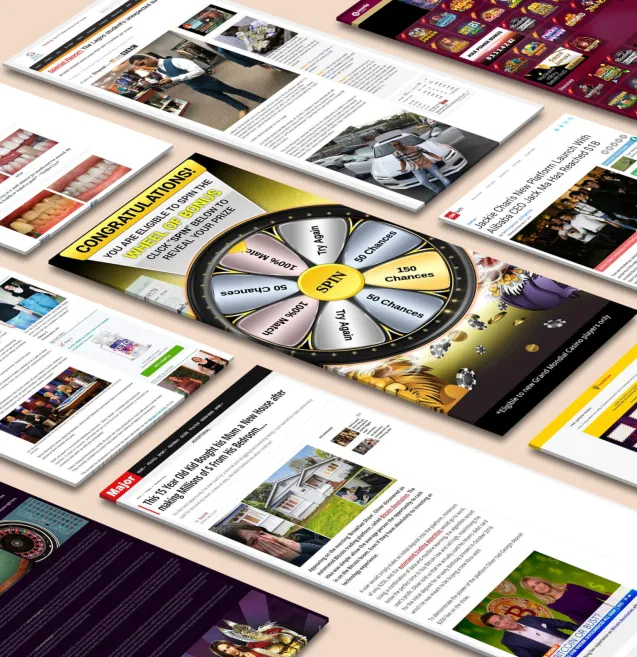
Our spy tools monitor millions of native ads from over 60+ countries and thousands of publishers.
Get StartedIn today's digital world, knowing how to write great copy isn't just a nice-to-have—it's a must. Engaging, high-converting copy sets creators apart from their competitors, turning average content into captivating stories that grab people's attention. Whether you're working on a headline, email, or social media post, impactful copy can make a huge difference in your success as a content creator.
Imagine being able to write better content than 90% of creators out there—and doing it quickly. This isn't just a fantasy; it's possible with the right tools and resources. The key is to explore expert knowledge and proven techniques found in copywriting books. These valuable resources provide practical advice and creative strategies to enhance your writing abilities.
Here are 10 copywriting books that can transform your content creation journey. These books are filled with tested methods to help you craft persuasive and unforgettable messages. Explore this carefully selected list and discover the power of words to not only engage but also convert your audience effectively. Are you ready to stand out from the crowd? Let's dive into these invaluable resources that will guide you towards becoming an exceptional creator.
Copywriting is an essential element in the world of marketing. It serves as a bridge between a brand and its audience, employing strategic language to persuade potential customers. The power of advertising techniques lies not just in their creativity but also in their ability to connect with human emotions and desires.
Understanding the role of copywriting involves recognizing its impact on consumer behavior. Effective copy can alter perceptions, evoke emotions, and drive actions. By tapping into human psychology in advertising, copywriters craft messages that resonate deeply with audiences.
An example is using urgency or exclusivity in headlines to prompt immediate action. "Limited Time Offer" or "Exclusive Access" can trigger a sense of scarcity or privilege, influencing decision-making processes.
The interplay between psychological insights and creative expression makes copywriting an indispensable tool for marketing success.
Michael Masterson's Great Leads is a groundbreaking book that explores how to connect products with what consumers really want. It provides valuable insights into understanding your audience's motivations and effectively communicating that through persuasive writing.
By incorporating these awareness stages into your writing, you can improve your skills and create advertisements that directly address each group's needs, turning casual interest into dedicated engagement. Schwartz's wisdom provides a guide for crafting copy that goes beyond simply selling—it's about connecting on a deeper level, laying the groundwork for successful marketing strategies.
Understanding how to communicate effectively is crucial in any form of writing. In "Cashvertising," Drew Eric Whitman explore the principles of effective communication that help create impactful and memorable messages. The book outlines six key principles that can make ideas stick: simplicity, unexpectedness, concreteness, credibility, emotions, and stories. These principles are invaluable tools for anyone aiming to write better content quickly.
Here are some of the key takeaways from "Made to Stick" that can help you improve your writing:
"Made to Stick" offers insights that are essential for writers seeking to outshine 90% of creators. By applying these techniques, you can transform ordinary ideas into unforgettable messages that resonate deeply with readers and elevate the quality of your content significantly.
Joseph Sugarman's The Adweek Copywriting Handbook is a valuable resource for anyone looking to master the art of persuasive advertisements. The book explores various techniques that are essential for creating compelling ads. Sugarman highlights the significance of understanding the psychology behind copywriting, particularly how it affects consumer decisions.
Sugarman provides a comprehensive overview of methods such as:
These strategies are designed to guide potential customers through the decision-making process smoothly.
A large part of the book is dedicated to understanding consumer behavior. Sugarman discusses how building trust is crucial in any advertisement, as it establishes credibility and reliability. Addressing objections effectively is another key focus, as it reassures potential buyers and reduces hesitation.
By applying these insights, you can improve your ability to write ads that not only grab attention but also convert interest into action. This handbook serves as both a guide and an inspiration for those striving to enhance their copywriting skills in a competitive market.
For aspiring copywriters, Dotcom secrets by Russell Brunson is a source of inspiration and guidance. This comprehensive guide taps into the minds of industry experts, offering a compilation of advertising secrets from successful copywriters. With contributions from celebrated figures in advertising, the book provides not just theoretical insights but actionable strategies that can elevate your writing.
The book features detailed accounts and personal anecdotes from renowned copywriters. These stories offer a behind-the-scenes look at how iconic advertisements were crafted, providing readers with invaluable lessons on creativity and strategy.
Aspiring writers will find an abundance of practical advice within its pages. The book includes exercises designed to hone your skills and encourage the development of a unique voice. These drills are tailored to help you think like a seasoned advertiser, focusing on clarity, impact, and originality.
By delving into this treasure trove of knowledge, you'll uncover what it takes to create compelling content that resonates with audiences. Whether you're just starting out or looking to refine your craft, Dotcom secrets by Russell Brunson serves as an essential resource for mastering the art of persuasive writing.
Dan Ariely's Predictably Irrational stands out as a unique fusion of self-help and copywriting techniques, providing readers with the tools to enhance both their personal development and writing skills. This collection of letters, written to his son from prison, offers a rare glimpse into the mind of one of the most influential copywriters.
Key insights from Ariely's writings include:
This book is a must-read for anyone striving to outshine 90% of creators by rapidly improving their content creation abilities. Through a blend of personal anecdotes and practical advice, Predictably Irrational equips you with the mindset and skills needed to excel in the competitive field of copywriting.
The Scientific advertising by Claude C. Hopkins is an invaluable resource for anyone looking to create attention-grabbing ads and emails across various platforms. The book distills essential techniques that are crucial for creating impactful content in print ads, websites, and email campaigns. Bly’s approach is refreshingly practical, offering tangible advice that writers can immediately apply to their work.
For those venturing into the freelance copywriting business, Bly provides a roadmap filled with actionable insights. He covers:
Whether you're refining your writing craft or navigating the freelance landscape, Scientific advertising offers strategies to enhance your skills and elevate your professional journey.
Understanding the impact of storytelling in writing can redefine how you engage with your audience. In "Persuasion Story Code" David Garfinkel delves into the science behind narrative structure and its power to captivate readers by tapping into their emotional cores.
A well-crafted narrative can transform ordinary copy into a compelling story that resonates deeply. Instead of merely presenting facts, incorporating a storyline allows readers to connect on an emotional level, making your message memorable and impactful.
Crafting a concise yet engaging story requires skill. To maintain clarity and brevity while integrating storytelling, consider these techniques:
Lisa Cron emphasizes that storytelling is not merely an addition to copywriting; it's a fundamental tool for connecting with audiences on a deeper level. By weaving narratives into your advertisements, you craft messages that linger in the minds of your readers long after they have moved on.
David Ogilvy, often hailed as the "Father of Advertising," distills the essence of successful advertising campaigns in his seminal work, Ogilvy on Advertising. This book stands out among the 10 copywriting books that’ll make you write better content than 90% of creators FAST by emphasizing fundamental principles of effective advertising.
Key Principles:
Real-Life Examples: Ogilvy illustrates these principles with real-life success stories from his illustrious career. For instance, his campaign for Rolls-Royce famously highlighted a quiet engine feature, leveraging research insights to appeal directly to potential buyers' desires for luxury and innovation.
Readers can glean invaluable insights from these time-tested strategies, applying them to create compelling and persuasive advertisements that resonate with audiences and drive marketing success.
Victor O. Schwab's How to write a good advertisement highlights the importance of testing different approaches in advertising campaigns. This practical guide emphasizes the significance of understanding what resonates with your audience by trying out various strategies. By adopting a test-and-learn mindset, you can uncover insights that lead to marketing success.
Split testing in advertising campaigns is a key focus of the book. It provides specific techniques for conducting these tests effectively, ensuring that you can identify which elements of your ads perform best. From headlines to calls-to-action, each component is carefully examined to maximize impact.
Schwab encourage readers to adopt a data-driven approach, continuously refining their copy until it resonates with their target audience. With these insights, your advertising efforts become more strategic and ultimately more successful, setting you apart from competitors who rely on guesswork instead of evidence-based decisions.
Influence: The Psychology of Persuasion by Peter H. King provides a deep dive into the reasons why some advertisements succeed while others fail. Sullivan's analysis is particularly insightful for identifying elements that resonate with consumers. He draws upon years of industry experience to dissect what makes an ad memorable and effective.
King emphasizes that the success or failure of an advertisement often hinges on its ability to connect with the audience on a personal level. By examining iconic ads, he reveals how emotional resonance plays a crucial role in capturing consumer interest.
One of the book's core messages is the power of simplicity in copywriting. Sullivan advocates for maintaining clarity without sacrificing creativity, suggesting that complex ideas should be distilled into straightforward, compelling messages. This approach not only enhances understanding but also ensures that the core message shines through.
The book provides strategies for delivering powerful messages concisely. By focusing on value, writers can craft copy that is both impactful and memorable, avoiding unnecessary embellishments that detract from the main point.
Sullivan's insights serve as a valuable guide for anyone aiming to create advertisements that stand out in a crowded market. His emphasis on simplicity and value offers practical techniques to elevate your copywriting skills, setting you apart from many creators.
These 10 copywriting books are a great resource to help you discover effective copywriting strategies and improve your writing skills. Each book offers unique insights that can transform your approach, enabling you to write better content than 90% of creators swiftly.
Here are some benefits you can gain from reading these books:
Invest time in these books; their wisdom is invaluable for anyone serious about copywriting. Embrace this learning path and watch your skills flourish, paving the way for content that resonates and connects with audiences on a deeper level.
Receive top converting landing pages in your inbox every week from us.
How-To
Native ads can do more than drive clicks—they can build long-term brand loyalty. Learn how to use authentic storytelling, strategic placement, and audience targeting to strengthen trust during year-end campaigns. Discover how subtle, value-driven messaging keeps customers engaged beyond the holidays. Ideal for marketers aiming to turn seasonal buyers into loyal brand advocates.
Marcus Chen
7 minDec 15, 2025
Must Read
As third-party cookies fade away, contextual targeting is making a powerful comeback. Learn how to leverage native ads that align with user intent and content relevance to maintain high engagement and conversions. Discover modern tools and tactics that make cookie-free targeting both precise and scalable. Ideal for advertisers seeking privacy-friendly ways to drive performance in 2025 and beyond.
Liam O’Connor
7 minDec 9, 2025
Recently Updated
Native ads can make or break your holiday marketing success. Explore how to evaluate your recent campaigns and identify what worked—or what fell short—with native advertising. Learn key optimization tactics to boost engagement, strengthen audience trust, and increase conversions in future promotions. Ideal for marketers aiming to refine their ad strategies after the holiday rush.
Elena Morales
7 minDec 1, 2025




